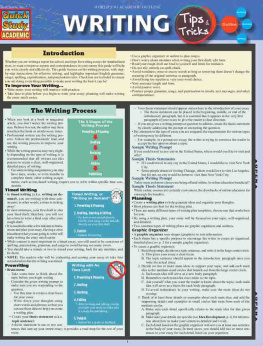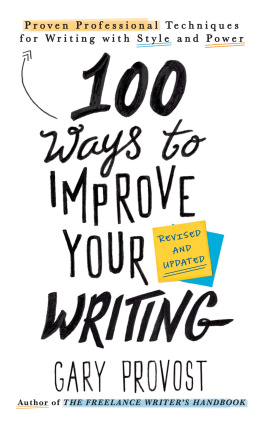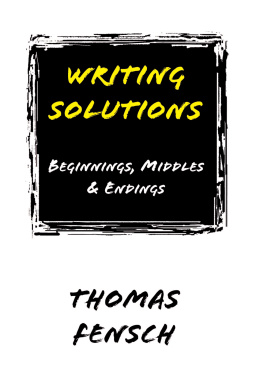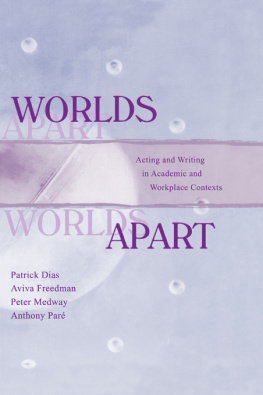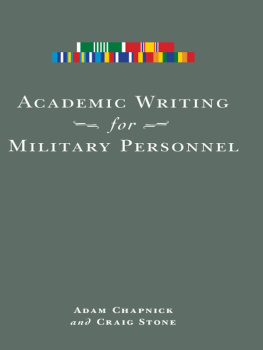Eck makes a convincing argument that complex prose or attempts to sound clever lead to frustrated readers and muddled ideas. He presents practical techniques to encourage us to write clearly and introduces tools that can help us to evaluate our progress. There is also lots of fun along the way.
Kate Bowers, Head of the Department of Security and Crime Science, University College London, UK
John Ecks Writing with Sweet Clarity is an imaginative, comprehensive, and altogether persuasive and practical kit of tools for improving student writing. I enthusiastically recommend the book for advanced undergraduate, masters, and PhD students. The book can assist students regardless of their professional aspirations.
Thomas Blumberg, Dean and Sheldon L. Messinger Professor of Criminology, College of Criminology and Criminal Justice, Florida State University, USA
Eck provides an essential resource for anyone working in the social sciences with this clever, simple, and useful guide to good writing. He takes you through key principles for each stage of the writing process, including important tips for creating the tables, graphs, and diagrams. This book is an exemplar of writing at its best!
Danielle Reynald, School of Criminology and Criminal Justice, Griffith University, Australia
In true Eckian fashion, John cuts through the problems of convoluted academic writing and provides straightforward guidance for us all. This guidebook is a must-have for students and early academics who want to be educated and entertained about the basics of simple, meaningful, and audience-specific writing.
Cynthia Lum, Department of Criminology, Law and Society, George Mason University, USA; and Co-Editor-In-Chief of the journal Criminology and Public Policy
Few academic programs provide systematic training in writingthe major form of scholarly and professional communication. Writing with Sweet Clarity fills this gap. John Eck develops the insight that the measure of a text is its success in communicating with its readers. His treatment is comprehensive and systematic. And he followed his own good advice, writing a text that will hold the attention of undergraduates and professionals alike.
Paul DiMaggio, New York University, Department of Sociology, USA; and A. Barton Hepburn Professor Emeritus of Sociology and Public Affairs, and Senior Scholar, Sociology Department, Princeton University, USA
Finally, a contemporary work full of tips and exercises to improve writing process. Ecks practical guide infuses humor and kindness as he explains everything from the basics, to writing with co-authors, to editing and reviews. Writing with Sweet Clarity is now required reading for my graduate and honours students and strongly recommended in my other classes. A must read for anyone seeking to improve their written communication or wanting to help others improve theirs.
Sheri Fabian, School of Criminology, Simon Fraser University, Canada; and Winner of the 2019 3M National Teaching Fellowship awarded by the Society for Teaching and Learning in Higher Education
The role of policing is changing, and our writing must be clear, concise, and convincing. Ecks ten simple commandments will entertain you and improve your writing skills. I found his book witty and easy to read. Every police officer needs this book.
Maris Herold, Chief of Police, Boulder (Colorado) Police Department, USA
Writing in English is challenging for non-native English speakers like myself. We tend to write long sentences to appear sophisticated but create sentences that are hard to comprehend. I could not agree with John more on writing short sentences using active voice to alleviate this problem. I highly recommend this book to anyone in geography, planning, sociology, criminology, or related fields.
Lin Liu, Department of Geography and GIS, University of Cincinnati, USA
In a world where we increasingly communicate by tweets and emojis, John Eck has published this marvelous book as a public service. Clarity of expression is vital in the arena of crime and policing decision-making. Students of this book will improve not just their grade, but also their connection to readers and policy makers.
Jerry Ratcliff, Department of Criminal Justice, Temple University, USA; Retired London Metropolitan Police officer; and host of the popular Reducing Crime podcast
John Ecks Writing with Sweet Clarity is a tour de force on the craft and joy of academic writing in the social sciences. Brilliantly written and chalk full of great advice, with a touch of humor, this book is essential reading for current and aspiring academics.
Brandon C. Welsh, Northeastern University, USA; and Director, Cambridge-Somerville Youth Study
Writing with Sweet Clarity
In this book, criminologist and experienced educator John E. Eck draws on decades of academic and professional writing experience to provide an analytical toolkit for clear professional writing. The book focuses on the essential objective of clarity, and addresses topics seldom addressed in other books, such as ethics beyond plagiarism; writing with co-authors; organizing complex ideas; using analytics to improve writing; crafting strong beginnings and endings; using examples and metaphors; and integrating tables, charts, and diagrams.
As universities continue to demand writing-intensive courses in the social sciences, this book is indispensable in university settings and throughout a professional career. The reader will use the practical advice, examples, and exercises in this book to master a method for clear writing unimpaired by stereotypical academic jargon. The book will help both new and seasoned researchers seeking to translate their work into a clear and accessible presentation for both professional and lay audiences.
Designed for and field-tested with graduate and advanced undergraduate students, this lively and easy-to-read book will work for courses taught in criminology, sociology, geography, and other social sciences, and will enable scholars to extend and broaden the impact of their research.
John E. Eck is Professor of Criminal Justice at the University of Cincinnati. There he teaches courses in policing, crime prevention, and writing. He also studies and writes about ways to reduce crime at extreme crime places. John received his masters of public policy from the University of Michigan and his PhD in criminology at the University of Maryland. Before joining academia, John led the research operations at the Police Executive Research Forum in Washington, DC. He then headed the evaluation unit in the Washington/Baltimore High Intensity Drug Trafficking Area. His writing appears in over 150 books, chapters, journal articles, and prescriptive guides for the police, public, and researchers around the globe. In 2001, John assisted the United States District Court, Southern District of Ohio, in developing the Cincinnati Collaborative Agreement. This agreement is a blueprint to reduce policecommunity conflict and violence. He and his wife live in Ohio and Maine, where he enjoys stone sculpting.


